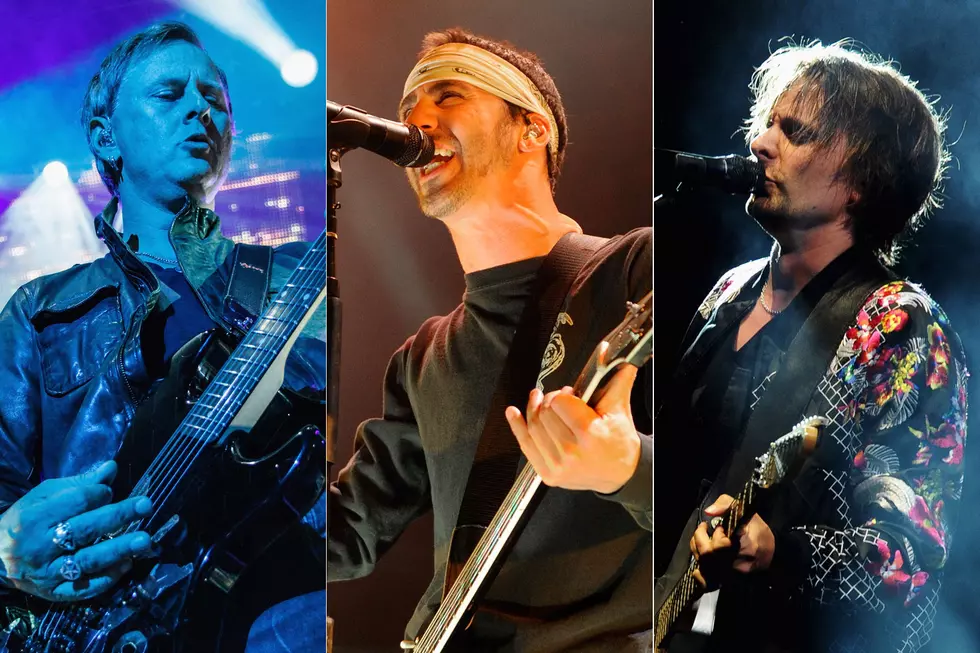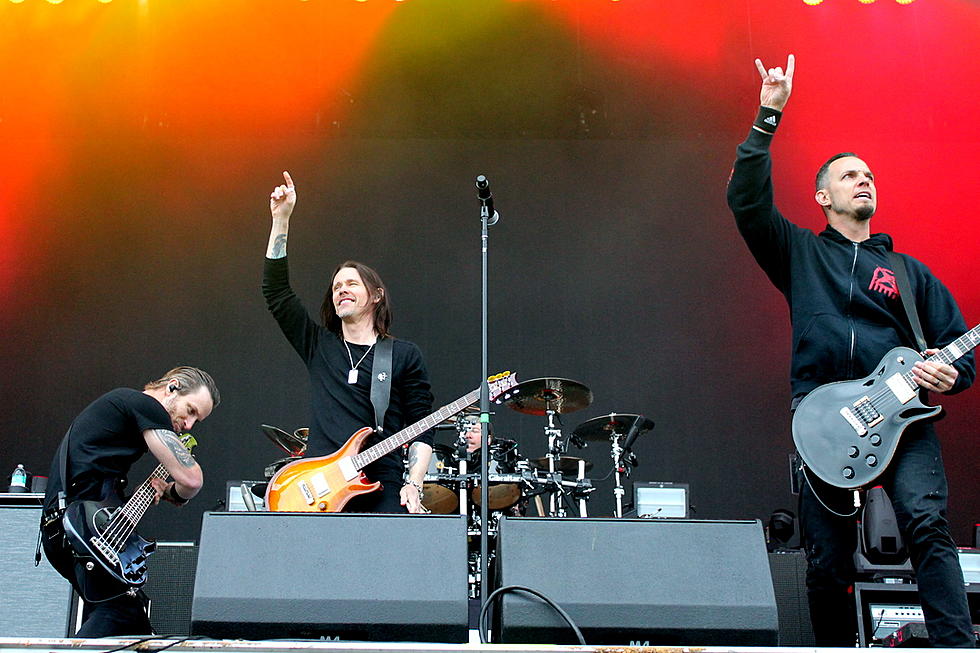![Frank Carter on Being a Festival ‘Conversion’ Band, Lineup Changes + World Politics [Carolina Rebellion Interview]](http://townsquare.media/site/366/files/2017/05/Frank-Carter-the-Rattlesnakes-1.jpg?w=980&q=75)
Frank Carter on Being a Festival ‘Conversion’ Band, Lineup Changes + World Politics [Carolina Rebellion Interview]
At most festivals attendees are there for the bands towards the top of the bill that they are already fans of. But one of the benefits of the large number of bands at Carolina Rebellion is that you can discover a lot of great new acts. One band that turned a lot of heads this year was the British band Frank Carter and the Rattlesnakes.
Energetic frontman Frank Carter was all over the stage, winning over fans with each new song. Their recently released second album Modern Ruin has done extremely well in the U.K., and as audiences have a chance to see their engaging live performance, their U.S. profile will expand as well. Their time on stage at Rebellion was brief, but they made the most of it. Before they played, Loudwire spoke with Carter about the challenge of winning over new audiences, life on the road and other topics. See our chat below.
Tell me about the lineup changes between album number one and album number two.
The only lineup change, really, is we got a new drummer. Got a guy called Gareth (Grover), and we just wanted something a bit more straightforward. Memby (Jago) is an incredible drummer. He's a little more punk rock, and we wanted to just take it into something that was a bit more straightforward rock. The other change that's happened since then is our bass player Thomas Mitchener left. He was always the producer of the records as well. So he left, and we got our guitar tech, Thomas Barclay. So Tank is now playing bass, Gareth will play drums, and the rest of it is the same.
You've got to be happy with the response to Modern Ruin going top ten in your home country.
Yes, it's incredible. It's been pretty crazy for us.
Talk about the challenge of conquering this part of the world.
This part of the world, one state here is bigger than my country. So, we're struggling. We try and think of every country as a local place. We start off with small venues and we build it up from the ground. In America, that takes ten years, so we're just going to keep coming back. We're going to keep doing what we do, and we're going to build it slowly like we built everything else slowly the world over, and hopefully at some point the scales will tip in our favor. But until then, we're just happy. We just feel lucky that we get to play music for a living.
What have been some of the high points for you so far in this current tour?
I think the festivals, for us, and L.A. We played L.A. for the first show, and it was sold out. To come all this way and play sold-out shows, it was pretty wild. We played our first couple festivals, and they were awesome. They were really, really cool.
You've been in a couple of different bands in the past. What have you taken from those experiences and applied to this group?
I'm now working with musicians that I get along with. Before, I wanted to work with musicians I really admired. I still want to do that, but I've got to be able to tour with them as well. None of us were really friends. Apart from me and Dean (Richardson, guitar), I didn't really know any of the other guys that well. And we're all really close friends now, because of this tour.
And then, business-wise, everything has changed. I brought everything I learned, all the mistakes I made, I've applied it to this. We're not signed to a major label. We've got a good management team now. We're doing things properly this time, man.
When you are playing a daytime set at a festival, do you approach it any differently than you would a small club show that's at 10 o'clock at night?
It depends. Basically, people that are at a festival, they want to have a good time. And so I just go out with the mentality that it's midnight and we just want to have a good time. Yesterday, we played at 3:00 in Virginia Beach, and it was raining. It had been pouring down all day. We walked onstage while they were patching our stage in still. We didn't even know if, when I sang, there was going to be volume.
But we just went out with the mentality to have a party and we did, and we won the whole crowd over, and that is our job here. It's not work. This is fun. I've got a wife that I love, I've got a two-year-old daughter who I love. If I'm going to be away from them for five weeks, I'd better enjoy the 40 minutes I've got on stage. And yesterday we had 20 minutes. You've got to squeeze 24 hours of enjoyment into that 20 minutes on stage.
It's been about a week since the last festival you played. Did you notice any sort of bump following that performance?
Definitely. Festivals, that's what they're for. You have the opportunity to play in front of such a huge number of people. So we're a conversion band. That's what we do best. We go out, we play to 1,000 people who don't know who we are, and we take 800 home with us, you know? That's what we want to do.
You have the versatility where you can play with punk, metal or rock bands.
Yeah, I think you can put us in any of those environments, and not that we're doing the same thing, but I think it can appeal to a wide range. I think people just see a band who are truly just doing their own thing, and that appeals to a lot of people.
How would you compare the European festivals to the ones over here?
I think festivals, weirdly enough, are pretty much the same wherever you go. It's just a lot of people that love music that want to have a good time, and if you go with the right attitude, then you can have a great, great experience. If you come with the wrong attitude, you can have a really bad time. And that's another thing I learned -- when I was young, I wanted to be playing club shows, because that's what I thought punk was all about. Now, I've really embraced the bigger stage, because I know what I can do with a lot of people.
How tough is it with a two-year-old at home, being all the way across the globe?
It's really hard. It’s really, really hard work. But I've got a really, really strong wife. I've got a really strong family, and they're incredibly supportive of what I do, so I couldn't ask for a better team at home that have been great role models for my daughter. I'm hoping that they all know that I'm not just doing this for myself. I'm doing it for them, as well.
Turning to politics, it feels like a very turbulent time in the world at the moment, doesn't it?
Yeah, I would say so. At the minute, we're in this digital frontier, where no one really understands what's happening in music. There's loads of exciting new technology, but no one really knows how to use it, and we're in a completely new frontier of politics, that no one knows what's going to happen. And to me, it's not exciting. It's terrifying. Just absolutely terrifying.
I had to register while I was out here to vote in the new one, because we've got a general election when we get home on the eighth of June, so I am really, really nervous.
Unlike the U.S. where elections are held at certain intervals, they can call for an election at different times in Britain.
She (British Prime Minister Theresa May) said that she would never do that, and now she's just forced it, and this is coming from a Prime Minister who was not elected. We're in a position where it's slightly different to what's happened here. There was a vote. You voted for Trump. At home, our Prime Minister just stood down, and this Prime Minister took it, and now she's trying to force an election at a point where she feels like she has the lead. So, we'll see what happens, but it's a scary time for everybody.
Our thanks to Frank Carter for the interview. Pick up Frank Carter and the Rattlesnakes' 'Modern Ruin' album via Amazon and iTunes, and look for the band winning over crowds at shows at these stops.
More From KZCD-FM




![In Flames’ Bjorn Gelotte on ‘Battles': ‘If We’re Happy With It, Then It’s an In Flames Record’ [Carolina Rebellion Interview]](http://townsquare.media/site/366/files/2017/05/In-Flames-2.jpg?w=980&q=75)
![Ded: ‘We Are Cooking Our Own Meal’ With ‘Mis.an.thrope’ Album [Carolina Rebellion Interview]](http://townsquare.media/site/366/files/2017/05/Ded.jpg?w=980&q=75)
![All That Remains’ Oli Herbert on ‘Madness’ Video, ‘The Thunder Rolls’ Cover + Symphinity Side Project [Carolina Rebellion Interview]](http://townsquare.media/site/366/files/2017/05/All-That-Remains-3.jpg?w=980&q=75)
![Citizen Zero’s Josh LeMay on Representing Detroit, Touring With Steel Panther + More [Carolina Rebellion Interview]](http://townsquare.media/site/366/files/2017/05/Citizen-Zero-4.jpg?w=980&q=75)


